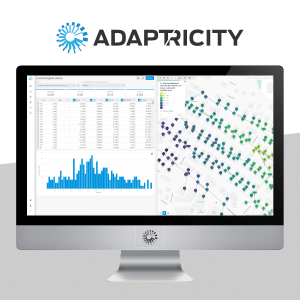As a result of rising natural gas and oil prices, we are becoming painfully aware of the urgent need to rethink the energy sources we use. Switzerland, is pursuing a clear goal and stipulates that by 2050 the energy supply throughout Switzerland should be 100% renewable (source; EnergieSchweiz).
With this target in mind, energy production from renewable sources such as solar, wind, hydropower, biomass, etc., is steadily increasing. The challenge? Renewable energy sources do not constantly generate the same amount of energy as we are used to from coal and nuclear power plants. So how do you create a balance between supply and demand? This is precisely what Adaptricity AG specializes in:
The task of intelligent power grids, so called smart grids: to balance the fluctuations of energy generated by renewable resources, as well as to respond to the increasing demand for electricity, we need an intelligent power grid, that is, a data network that is tuned to the power grid. This measures energy generation, storage, and consumption and optimally coordinate them with each other. For example, with the help of our Adaptricity.Plan software solution, load flow, short circuits, network reinforcements, stress tests, or connection re-quests can be calculated with just a few clicks. Suppose the smart grid detects, for example, that more electricity is being produced than is needed. In that case, individual plants such as wind turbines or solar plants can be specifically slowed down in the smart grid—our Adaptricity.Sim software solution can also be used to calculate detailed analyses of the dis-tribution network based on time series simulations with real measurement data.
In addition, the smart grid can use smart meters - intelligent meters - to drive higher electricity consumption by end-users. Adaptricity.Mon also offers comprehensive grid monitoring using smart meters and measuring devices in transformer stations.
Conclusion: The information and communication technology (ICT) behind this data network can intelligently regulate the fluctuating energy supply and the power supply in the grid. Thus, a smart grid transports energy and relevant data for the grid operator. This data contains information about energy production and its consumption, helping to reduce the risk of unstable grid conditions. Smart grids thus enable intelligent networking, load management, flexible action on electricity demand, and therefore efficient use and integration of renewable energies and optimization of grid utilization.








